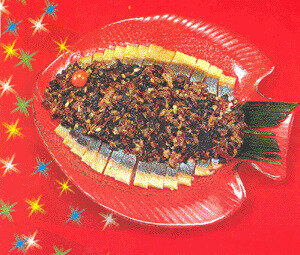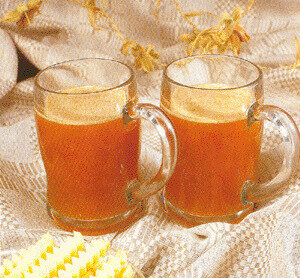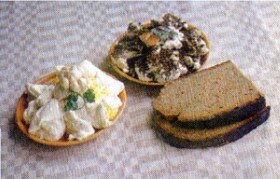Lithuanian cuisine
National dishes
Traditionally, during a meal, the table would be covered with a linen tablecloth. Bread was put on the table at the very beginning, for it was considered sacred. A loaf of bread could never be placed on the table upside down, as this was considered disrespectful. A consecrated piece of bread used to be put into the foundation of a new building or carried by travelers during a journey.
Lithuania is relatively small; however, the cuisine of the various regions differs. Samoghitians (žemaičiai) eat porridge, stew and kastinis (similar to cottage cheese). Aukštaičiai enjoy various pancake and curd dishes. Dzūkai are very fond of buckwheat, which grows well in their sandy soil; they are also skilled in collecting and drying mushrooms and preserving them in other ways. Suvalkiečiai enjoy smoked meat, especially pork.
The oldest Lithuanian foodstuff is rye grain for making rye bread. Some of the most popular kinds of rye bread can be found in any food shop in Lithuania. Vilnius bakeries produce 15 kinds of rye bread. Some varieties are baked with nuts, raisins, whole grains, caraways and sunflower seeds, while other are even baked over marsh reeds. Some rye breads are noted for their coarse texture and partially milled rye grains, while others leave a pleasant sour taste. Over 70% of the bread consumed in Lithuania is dark rye bread.
Pork is the most popular meat, and it is eaten fresh, salted or smoked. Lithuanians also make a great variety of sausages.
Šaltibarščiai, cold beet soup, is a favourite dish on hot summer days. Served with sour cream and an accent of dill, with hot potatoes on the side, it makes for a delicious meal in itself.
Potatoes are of great importance in the national cuisine, and potato pancakes covered with bacon or sour cream are universal favourites. Potatoes only appeared in the 18th century, but as early as the first half of the next century, they had become as important as bread for the common people.
Lithuania is a beer-loving country. Today most beer is produced in large, modern breweries, though in the north, home-made beer is also brewed. For family celebrations or major holidays, home-made beer is sometimes brewed by the householder himself.
Buckwheat cake
You need:
- 1kg of buckwheat flour, 0,5l of milk, 30gr of yeast, 2 eggs, 100g of butter, salt.
- First, beat the eggs and milk. Separately mix up the butter.
- Secondly, pour milk and eggs into butter, mix in flour.
- Lastly, put grinded yeast with sugar and mix everything until the mass is soft.
- Grease the tin-plate and put the dough into it.
- Let it stand in the warm place until the dough rises.
- Bake for about 50-60 minutes.
Christmas eve dishes
Šližikai (christmas eve biscuits) with poppy seed milk
- 1 cup self-rising flour
- 2 cups ordinary flour
- 2 tbsps. powdered sugar
- 1 egg
- ½ lb. margarine (two sticks)
- 1 cup cold water (approx.)
Mix all ingredients (margarine should be room temperature- soft), knead dough, cool in refrigerator 2-3 hours or overnight, roll into finger-width strips, cut into inch long pieces and bake on a cooky sheet at 350? oven until brown.
Marinated herring with mushrooms
- 2 herrings
- 2 onions
- 8 oz. can mushrooms drained
- ¼ cup oil
- 2-3 bay leaves
- ½ tsp. ground white pepper
- 1 tbsp. lemon juice
Soak herring 48 hours in cild water, changing water at least three times. Wash, skin, remove bones and cut into a small pieces. Saute chopped onion in oil only until tender, do not brown. When onion is soft, add mushrooms and bring to simmer. Cool well.
Black bread cide
- 1 to 1½ lb. dried black rye bread
- 2 gallons boiling water
- 1 lb. honey
- 1 tbsp. fresh yeast (not dried)
- 1 tbsp. flour
- 10-12 raisins
Grumble bread, place in bowl and cover with boiling water. Cover tightly. When cooled, strain, add honey, yeast mixed with flour; mix well until honey is dissolved. Keep at room temperature 12 hours. Strain, pour into bottles, add several raisins to each, cork. Ready to drink in 2-3 days. Afterwards, keep refrigerated.
Lowland dish made of beaten cream (kastinys)
You need:
- ½ l sour cream,
- 1 spoon butter,
- ½ teaspoon thyme or other spice, salt.
Into the boul put butter, spoon of sour cream and when it is inserted into hot water, it is twisted with wooden spoon. Till butter-milk is not separated, insert a spoon of sour cream again and twist till all sour cream is used. When it starts to thicken, put salt, pour in washed and dried thyme, and mix well. This dish is a little bit of salty, softly sour taste. You can eat it with hot, in peelings boiled potatoes or barley.
You can put mint, mill scent pepers, fennels or garlic instead of thyme.
Aukštaitiškas beef
You need:
- 800g beef,
- a litlle bit of 9% vinegar,
- 40g fats, ½ glass of stock for roast cook,
- vegetable seasoning, salt.
Filling:
- 2 spoons of grated horse-radish,
- 20g dry boletus,
- 2-3 onions,
- 40g butter,
- crisps, salt.
Beat the beef.
- Scald with boild salty water drain, rubb in with some spice and salt.
- Then put in heat fat and bake in the oven.
- Pour some stock.
- When the beef is half baked take it out and make few cuts.
- Then put some filling and bake more.
- Pour some hot stock and water.
Filling.
- Put some cracks,
- horse - radish,
- boiled and cut boletus into onions baked in butter.
- Everything is mixed.
Cut the roast into slices and water with strain juice in which it was baked. You can eat it together with boiled patatoes, pickled cucumbers or any other salad.
Information collected by
Monika Aziulevičiūtė 3r form student
Danutė Januškevičiūtė 10a form student
Rita Aziulevičienė - teacher




